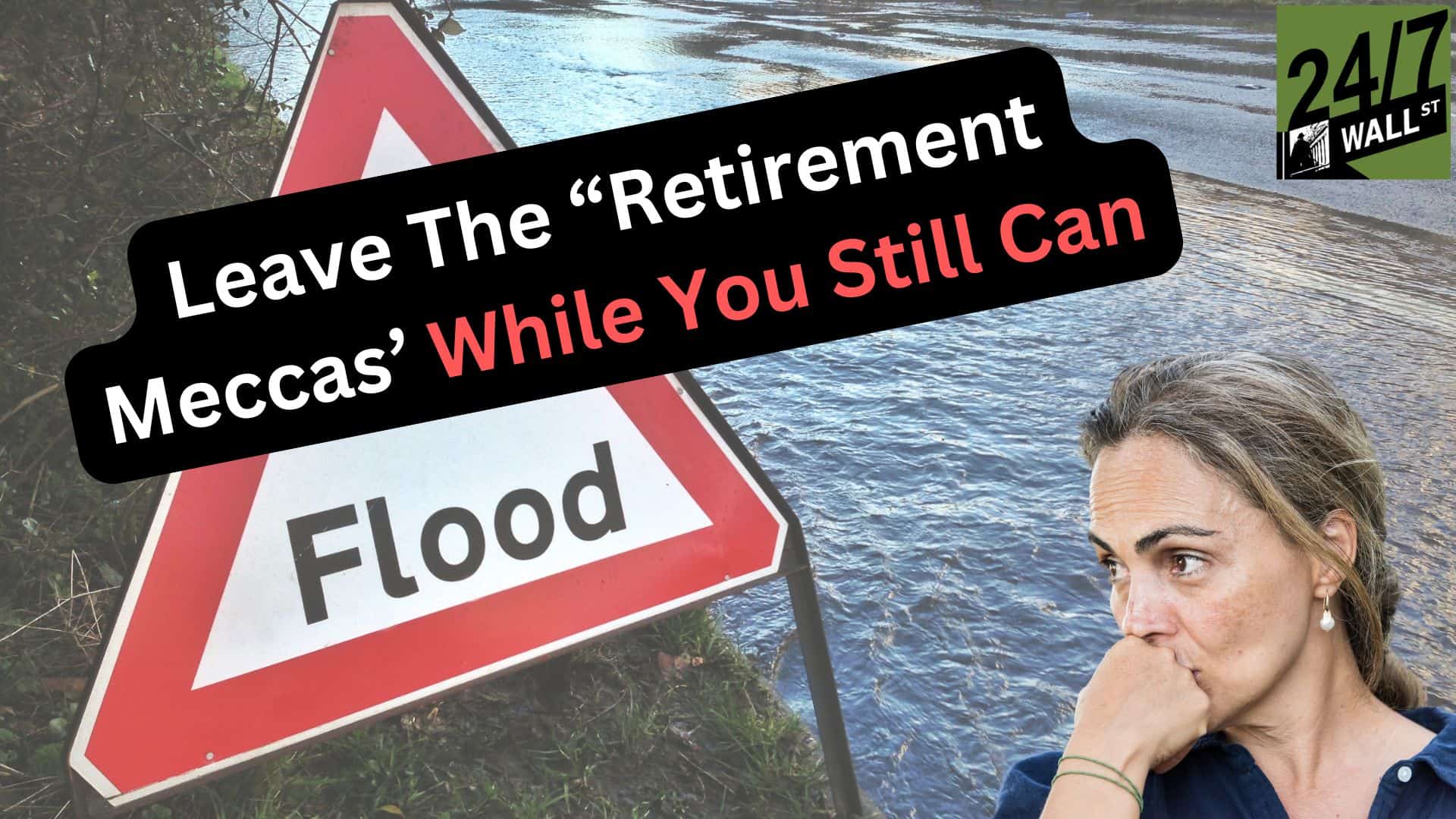
This post may contain links from our sponsors and affiliates, and Flywheel Publishing may receive
compensation for actions taken through them.
compensation for actions taken through them.
Key Points
- The difficulty and expense associated with insuring, and rebuilding homes in popular retirement destinations is becoming untenable.
- Limited materials and labor just further the problem for retirees
- Once popular states like Arizona and Florida may no longer make sense to move to
- Also: Retirees can see if they’re ahead, or behind on their retirement goals today with a simple quiz. Speak to an expert today (for free).
Watch the Video
Video Transcript
[00:00:00] Doug McIntyre: A lot of people will not be able to rebuild houses for a year. First, no electricity. Second. You have to get lumber someplace. I mean, it’s not like the people in the Tampa St. Pete area and south of there can actually just go say, Oh, well, we’ll just take a third of the lumber in the United States, limited number of contractors.
[00:00:20] Doug McIntyre: So if I am an American, I’m 60 years old, I know I’m going to retire soon and I’m looking for a place to go. We are starting to see people, and this is how I would view it. If I was looking at a retirement now, if you’re going to leave another 15 or 20 years, you do not want to buy real estate in Phoenix or Florida or two or three other places that you and I know where that we’re.
[00:00:46] Doug McIntyre: Automatic on the list of retirees until recently.
[00:00:52] Lee Jackson: Yeah, I, I, I couldn’t agree more. And, and even though, and we had, we had done a piece on this prior to the hurricane, and again, I’m gonna be very honest about this. Tampa Bay dodged a huge bullet because that was coming in, you know, as a cat four to five.
[00:01:09] Lee Jackson: And the eye just died as it got close to Tampa and they were so fortunate and actually instead of a flood of water into the bay that water actually was sucked out of the bay and it’s it was still horrible but it spared you know it spared what could have been real mass destruction a la Katrina but like like you said Doug and having lived in New Orleans for the area for over 10 years when when these uh, storms come in.
[00:01:42] Lee Jackson: Numbe front of your home will s month or two months. That removed and then you’ll h on the roofs and you’ll h can take years to rebuild there will be a lack of s You don’t just have the issues in florida. You have it all up the up the coast up through georgia up through south carolina Up through north carolina where the storm turned north and was really destructive And yeah, I think more and more people are going to start to consider retirement areas where it’s still warm But it doesn’t have exposure to to hurricanes
[00:02:24] Doug McIntyre: Yeah.
[00:02:25] Doug McIntyre: So again, if I’m giving advice to somebody who’s looking at retirement, uh, Phoenix is now the sixth largest city in the United States. Influx of population last 30 years, huge. You’re going to have days according to the current forecast 10 years from now. Where people are not going to be able to work outside at all.
[00:02:44] Doug McIntyre: Now, if I’m retired, I’m not working, but it would still be nice to be able to go outside without air conditioning, a place like Phoenix. Another thing people have to look at is, is there a drought situation? Am I going to buy real estate and retire someplace with the chances that there’s going to be too little water?
[00:03:03] Doug McIntyre: A place like Phoenix and areas around in Phoenix and New Mexico. You got to think twice about that now. So what I would describe as the retirement Mecca’s places like New Mexico, Arizona, Florida, Eastern seaboard. If, if you’re, you know, If you’re in Albany and you’re going to retire, do one of two things, either stay in Albany, or if you want to be someplace warm, take a look at everything from, you know, flood maps to temperature and increase rain.
[00:03:38] Doug McIntyre: It’s time for people to start to be much more selective about where they go instead of just saying, well, it’s going to. going to be low taxes.
[00:03:49] Lee Jackson: Yea there’s a lot of places s Mason Dixon line, which a warm in the summer, hot i where I live here in, you Mississippi, it’s warm in again, it goes away and t action up here in northern and they’re here, Tennesse Arkansas, people are starting to look in Arkansas, Tulsa, Oklahoma, people are looking there.
[00:04:18] Lee Jackson: I mean, cities that you wouldn’t think would be a retirement Mecca are actually places that more and more people are starting to go.
[00:04:25] Doug McIntyre: Yeah. So Zillow just added a climate risk, uh, local climate risk to its, uh, you know, its search feature. So for all of you who are thinking about moving, buying a house, go check someplace like Zillow or, you know.
[00:04:45] Doug McIntyre: The National Weather Service long range forecast, find some things that allow you to make an intelligent decision that are, that is not just a knee jerk decision, which is a lot, what a lot of people did when they moved to Florida.
[00:04:58] Lee Jackson: Or because you have friends there or something of that nature. That’s knee jerk.
[00:05:02] Doug McIntyre: Yeah.
The Average American Is Losing Momentum on Their Savings Every Day (Sponsor)
If you’re like many Americans and keep your money ‘safe’ in a checking or savings account, think again. The average yield on a savings account is a paltry .4%* today. Checking accounts are even worse.
But there is good news. To win qualified customers, some accounts are paying nearly 10x the national average! That’s an incredible way to keep your money safe and earn more at the same time. Our top pick for high yield savings accounts includes other benefits as well. You can earn up to 3.80% with a Checking & Savings Account today Sign up and get up to $300 with direct deposit. No account fees. FDIC Insured.
Click here to see how much more you could be earning on your savings today. It takes just a few minutes to open an account to make your money work for you.
Thank you for reading! Have some feedback for us?
Contact the 24/7 Wall St. editorial team.





